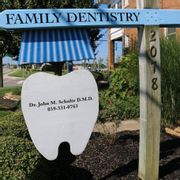A Guide to Caring for Baby & Toddler Teeth

Good oral hygiene is an important lifestyle that should be ingrained in your children as early as possible. Cavities may not seem as bad when they happen to a baby’s teeth since those teeth will eventually fall out as your child develops; however, ignoring tooth decay and other complications early in life may cause worse problems later in time. This is why it is important to treat your baby’s teeth with the same diligence that dentists recommend you care for your own.
Common Issues
Among the most common issues are cavities, which occur when the natural bacteria in your mouth break down residue from carbohydrates to create acids. These acids then combine with the bacteria and saliva to create plaque. Plaque bonds to the enamel of your teeth and begins to dissolve it.
Aside from cavities, tooth decay and bacterial growth can pose a risk to gum health. For babies whose teeth may not have all broken through the gum, tooth decay can begin to affect the tissues of the gum itself as the teeth are first appearing.
Causes
Common causes of tooth decay in babies and toddlers stem from snacking on sugary foods, the use of a baby bottle or sippy cup, drinking milk, juice or formula, and simply not cleaning their teeth. Children who go to bed with a bottle of milk or juice are more likely to have tooth decay, since the liquids stay in their mouth overnight, exposing their teeth to sugars for a longer time.
Prevention
 The key to preventing tooth decay is through practicing good dental hygiene. Clean your baby’s teeth every day and check for signs of plaque, such as white or brown spots on the teeth or gum. Use a soft toothbrush or moist cloth for infants, and use very small amounts of toothpaste once teeth start to come in, brushing the teeth every morning and every night.
The key to preventing tooth decay is through practicing good dental hygiene. Clean your baby’s teeth every day and check for signs of plaque, such as white or brown spots on the teeth or gum. Use a soft toothbrush or moist cloth for infants, and use very small amounts of toothpaste once teeth start to come in, brushing the teeth every morning and every night.
Once your baby's teeth grow enough that they begin to touch, it’s time to introduce flossing. Consider giving your child water in between feedings, rather than milk or juice, to help wash out your child’s mouth and quench thirst. Also, not giving them a bottle or sippy cup at bedtime significantly reduces the risk of cavities.
If you have any questions about your child’s dental health, contact the professionals at North Ft. Mitchell Dentistry in Covington, KY. These dental experts have offered quality family dentistry for northern Kentucky for over 40 years. Call them today at (859) 331-0763, or visit their website for more information.
About the Business
Have a question? Ask the experts!
Send your question

